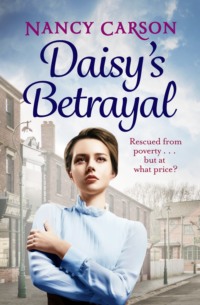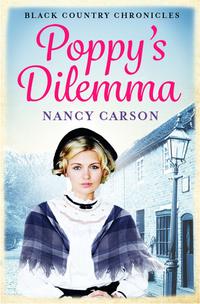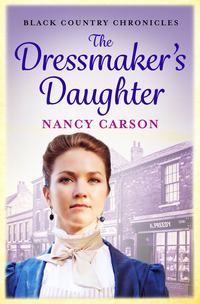
Полная версия
A Country Girl
The huge clock that adorned one wall had a tick that sounded more like a clunk, even above the buzz of conversation, and Algie watched its hands slowly traverse its discoloured face. He drank his beer, trying to appear casual and unhurried, as if he was really enjoying it. He dropped the occasional greeting to various men who approached the bar for their refills, and took a casual, benign interest in a game of bagatelle other men were playing.
Eventually, he stepped outside once more into the unseasonably warm sunshine of the late April afternoon. At the bridge he hesitated and, for a brief second, watched the sun-flecked sparkle of the water as it lapped softly against the walls of the canal, plucking up the courage to approach Marigold again. He looked for the Sultan – the name given to Seth Bingham’s horse boat – and saw Marigold conscientiously wiping down the vivid paintwork of its cabin with a cloth. It was now or never, he thought as he rushed onto the towpath and approached.
‘Busy?’ he asked, beaming when he reached her.
She looked up, momentarily startled, evidently not expecting to see him, and smiled when she realised it was Algie Stokes again. ‘It has to be done regular, this cleaning,’ she replied pleasantly.
Up close – and this was as close as he’d ever been to Marigold – she was even more lovely. Her skin was as smooth and translucent as finest bone china. Her eyes seemed bluer, clearer, and wider; her dark eyelashes so unbelievably long. Her lips were upturned at the corners into a deliciously friendly smile, and he longed to kiss her. The very thought set his heart pounding.
‘Your two boats always look sparkling,’ he remarked with complete sincerity. ‘I’ve noticed that many a time.’
Marigold smiled proudly. ‘It’s ’cause me mom’s so fussy. She don’t want us to be mistook for one o’ them rodneys what keep their boats all scruffy. And I agree with her.’
‘Oh, I agree with her, as well. Where’s the sense in keeping your boat all scruffy when you have to live in it?’
‘And while we’m moored up, what better time to clean the outside?’ she said with all the practicality of a seasoned boatwoman. ‘We’m carrying coal this trip and the dust gets everywhere.’ She rolled her eyes, so appealingly. ‘You can taste it in your mouth and feel it in your tubes. It gets in your pores and in your clothes. It’s the devil’s own game trying to keep anything clean when you’m a-carrying coal.’
‘I can only begin to imagine,’ he replied earnestly, truly sympathetic to the problem. ‘I know what it’s like in our coal cellar. It must be ten times worse on a narrowboat. So you’re bound for Kidderminster, you reckon?’
‘Tomorrow. We’ll be on our way at first light.’
‘What time d’you expect to get there?’
Marigold shrugged. ‘It’s about dinner time as a rule. Then it depends if we can get offloaded quick. Some o’ them carpet factories am a bit half-soaked when it comes to offloading the boats, ’specially if you catch ’em at dinner time. Me dad likes to wind round and get back. He gets paid by the load, see? Me, I don’t mind if we get stuck there till night time. We do as a rule.’
‘Got much more cleaning to do?’
‘Only a bit. We’ve all got our jobs, but I’ve nearly finished mine for today.’
‘Fancy a walk then?’ Algie enquired boldly, seizing the moment.
‘A walk?’
He nodded. ‘I could take you a walk over the fields or up the lanes, if you like. You must be sick o’ looking at the cut all the time.’
She instantly flushed. ‘I’ll have to ask me mom.’
‘Ask her then.’ Algie’s heart skipped a beat. Marigold had agreed in principle. This was significant progress. All that stood in the way now was perhaps her mother.
Marigold smiled with blushing pleasure, and nipped inside the cabin.
Algie could no more help flirting with a pretty girl than some people can help stammering, but he had not the least intention of breaking anybody’s heart. For a start, he did not take himself seriously enough, he was not good-looking enough to succeed. The desire to elicit a smile from a pretty face was strong within him, however.
Hannah Bingham nipped out, holding a limp dishcloth. ‘You want to take our Marigold a walk?’ she asked, not unpleasantly.
‘If you’ve got no objection, Mrs Bingham,’ he answered with an apologetic but appealing smile. ‘She says she’s finished her jobs.’
‘I got no objection, young Algie, as long as she’s back well afore sundown.’
‘Oh, she’ll be back well before then, Mrs Bingham, I promise.’
‘Then you’ll have to give her a minute to spruce herself up if she’s going a walk.’ She turned and spoke to her daughter in the cabin. ‘Our Marigold, change into another frock if you’m going a walk with young Algie.’ She turned back to Algie and smiled. ‘Why don’t you come back in ten minutes when she’s ready, eh?’
Algie grinned with delight. ‘All right, I will, Mrs Bingham.’
He could hardly believe his luck. Marigold had agreed to accompany him on a walk, and her mother had sanctioned it. The prospect of getting the girl alone had, till that moment, seemed an improbable dream, but a dream he’d diligently clung to. He sauntered back to the lock-keeper’s cottage, thrilled. Maybe he had a way with women after all. Maybe he did possess some fascination or irresistible power over girls, despite his doubts. For so long he’d thought it unlikely. There was a suspicion meandering through his head – he knew not from where it came – that, in any case, a handsome face was not the be-all and end-all for women, but he just didn’t have the experience to know if it was true. For the time being, it was enough that some young women blushed when he spoke or smiled at them; and he made a point of smiling at all those girls who were pretty, whatever their station in life, rich or poor. If they thought he was ugly or uninteresting they could always turn their heads and ignore him. Yet they seldom did. Only the very stuck-up ones, and stuck-up girls he could not be doing with anyway.
He returned home to wait. Over the fireplace in the parlour was a mirror. He stood in front of it and looked at himself, but was not impressed. He straightened his necktie and tried unsuccessfully to smooth his unruly curls with the flat of his hand.
‘Oh, there you are,’ his mother said, suddenly appearing from the brewhouse outside. ‘Fetch some coal up from the cellar for me, our Algernon. There’s scarcely any left in the scuttle.’
‘Can’t our Kate do it?’ he complained. ‘I’ll get all mucked up and I’m going out in less than ten minutes.’
‘Our Kate’s busy changing beds ready for washing day tomorrow,’ Kate herself chimed in, opening the stairs door as she descended with a bundle of sheets and pillowcases in her arms. ‘You wouldn’t be very pleased if your bed was black as the devil from the coal in the cellar, would you? Anyroad, where are you off to of a Sunday afternoon?’
‘Mind your own business.’
‘I’ll mind me business if you’ll fetch the coal up.’
‘Oh, all right,’ Algie muttered reluctantly, knowing it to be futile attempting refusal to these two women, ranged against him with a singular will. He opened the door to the coal cellar and disappeared with the scuttle.
His task completed, he went to the brewhouse and washed his hands. Behind him, his mother complained that he had left damp coal dust on the scullery floor, which he’d brought up from the cellar on the soles of his boots.
‘Our Kate should have gone down,’ he called back. ‘She’s got smaller feet than me. She wouldn’t have made so much mess.’ Then, before he could be asked to perform any more disagreeable chores, he dashed outside and returned to the Bingham’s butty, waiting for Marigold to appear.
From where the Stokes’s cottage stood, the canal descended by a series of locks and basins towards Wordsley. You could see, beyond the massive cone of the Red House Glassworks, green valleys swooping between wooded hills and leafy glades. Towered and spired churches clad in the ivy of centuries dotted the landscape, as well as cosy homesteads, farmhouses and stately old manor houses. Nibbled pastures, where sheep and cattle grazed, receded into the hazy green distance. It was a sight that cheered Algie’s heart.
Over the hill in the opposite direction lay, incongruously, a black industrial wilderness of slag heaps, mines, glassworks, and forges. Foundries and ironworks belched forth acrid brown smoke from great chimney stacks, and red flames from open hearth furnaces, even on this warm spring Sunday. Humble little red-brick houses shared this desolate eastward outlook, sparsely dotted with clumps of coarse grass, railways, viaducts and bridges as well as the interlinking canals with their locks, basins and wharfs. This was the astonishing landscape of the Black Country, that broad tract of man-made bleakness that lay roughly between the opposing boundaries of Wolverhampton to the west and Birmingham to the east. Yet it held as much diversity as you could reasonably assimilate in a month of Sundays if you cared to look. Prosperity lived symbiotically with hardship, as did culture with ignorance, good taste with bad, virtue with wantonness, respectability with indelicacy, and hard work with idleness. Significantly, the Black Country, for all its limited size, generated a disproportionate amount of the enormous wealth that enabled Britain to wield such undeniable power in the world.
Marigold popped her head round the cabin door.
‘Oh, you’re back then.’
‘Yes, I’m back. Are you ready yet?’
She nodded and stepped out onto the gunwale, then onto the towpath. ‘I just wanted to change me frock, wash me face and tidy me hair up a bit. Me mom don’t like me venturing away from the cut in me working frock. She says it’s common to do that.’
He smiled his response, looking her up and down. The frock was plainly cut in muslin and well-washed, the floral pattern almost faded from enthusiastic and frequent laundering, but she looked divine, and there was no shame in cleanliness. It fitted her perfectly, enhancing her slender figure. Her dark hair had been hurriedly brushed and re-pinned, and it was tidier now.
‘You look ever so nice,’ he said sincerely.
‘Thank you. So do you in your Sunday best suit. Where you taking me?’
‘There’s a path over the fields to Kingswinford. I bet you’ve never been there?’
She shook her head. ‘Not if there ain’t a cut what goes there. Is it far?’
‘A mile, a mile and a half, maybe – nothing really. But it’s a fine afternoon for a stroll.’
‘What is there at Kingswinford? Anything special?’
He shrugged. ‘Nothing special. It’s just a nice walk over fields.’
He led her back to the bridge he’d just come from and onto the lane that led first to Wordsley.
‘I’m thinking of getting meself a bike,’ he announced, in a manner calculated to impress.
‘A bike? Blimey.’ Marigold sounded duly impressed. ‘I wish I could have a bike. I could ride to the locks ahead of our narrowboats and open ’em ready. It wouldn’t half save us some time.’
‘Suggest it to your dad. Mebbe he’ll buy one.’
‘I doubt whether he could afford one. How much do they cost?’
‘About twelve pounds with pneumatic tyres. Pneumatic tyres are best. You don’t want solid tyres.’
‘Twelve pounds?’ Marigold queried with disbelief. ‘That’s a fortune. Me dad would never spend that much, even if he’d got it to spend.’
‘I’ve been saving up for ages.’
‘Where would you moor it?’
‘In our shed.’
‘What d’you do for a living, Algie, if you can afford to buy a bike?’
‘I make brass bedsteads at Sampson’s up at Queen’s Cross in Dudley. A bike will be handy for getting to work and back.’
‘Don’t you fancy being a lock-keeper, like your dad?’
‘Me? Nah. It don’t pay enough wages. You get your coal for free, granted, and a house to live in as part of the job, but I wouldn’t be a lock-keeper. Me dad gets called out all hours. I wouldn’t want that. I like peace and quiet. How about you, anyway? D’you intend to spend the rest of your life on the narrowboats?’
‘Depends,’ she said with a shrug.
‘On what?’
‘On whether I marry a boatman – a number one, f’rinstance.’
‘A number one? You mean a chap who owns his own boats?’
‘Yes.’
‘Got your eye on anybody?’ he asked, dreading her answer, but grinning all the same.
She shrugged again. ‘Dunno. Nobody on the boats at any rate.’ She gave him a sideways glance to assess his reaction.
‘Who then?’
‘I ain’t telling you.’
So there was some chap in her life. Damn and blast. It was naïve of him to think otherwise, a girl like Marigold.
‘Go on, you can tell me.’
‘There is a chap I like,’ she admitted. ‘He ain’t a boatman. He works at one of the carpet factories in Kiddy. He’s one that generally helps offload us.’
‘Oh, I see … So the crafty monkey sees to it as you don’t get offloaded on the same day as you arrive. That way, you have to stop over till next day, eh? Then you can meet him at night. Is that it?’
Marigold blushed, smiling in acknowledgement of the truth of Algie’s astute assessment.
‘So you’ll be doing a spot of courting tomorrow night, then?’
‘I suppose. It depends.’
‘What’s his name?’
‘Jack.’
‘Shall you tell him about me?’
‘What is there to tell?’ She glanced at him again.
‘Well … you could tell him that you went a walk with another chap.’ He regarded her intently, and caught a look of unease in her clear blue eyes at the idea.
‘So, what about you?’ she asked, intent on diverting the focus from herself. ‘Do you have a regular sweetheart?’
‘Me? Not really.’
‘Not really? You either do or you don’t.’
‘There’s this girl I’m sort of friendly with … But it ain’t as if we’re proper sweethearts … I mean we ain’t about to get wed or anything like that.’
‘And shall you tell her you been a walk wi’ me this afternoon?’
‘Like you say, there’s nothing to tell, is there?’
‘Not really …’ She smiled at his turning the tables back on her. ‘What’s her name?’
‘Harriet.’
‘That’s a nice name.’
‘Maybe we should get Harriet and your Jack together, eh?’
She laughed at that. ‘Is she pretty, this Harriet?’
‘Nowhere near as pretty as you. Jack would fancy you more than Harriet, for certain. I do at any rate … I’ve been noticing you for a long time … seeing you come past our house from time to time. I’ve often thought how much I’d like to get you on your own and get to know you.’
‘Have you, Algie? Honest?’ She laughed self-consciously.
‘Yes, honest.’
‘That’s nice … I’m surprised, though.’
‘Don’t be surprised. Next time you come through the lock and pay your penny let me know you’re there, eh? ’Specially if it’s of a Sunday, or if you’re mooring up for the night close by. We could go for walks again then. I mean to say, the summer’s only just around the corner.’
‘And you wouldn’t mind me asking for you?’
‘Course not. I’d like you to. I’m inviting you to.’
She looked him squarely in the eye, with an open, candid smile. ‘I just might then … And your mother wouldn’t mind?’
‘Why should she mind?’
She shrugged girlishly. ‘Dunno … What if she don’t like me?’
‘Oh, she doesn’t dislike you, Marigold. She knows your family. Lord, you’ve been coming through our stretch of the cut long enough.’
‘How old is your mom, Algie?’
‘Two-and-forty.’
‘She don’t look it, does she? She looks about thirty. I mean she ain’t got stout or anything.’
‘No, she doesn’t look her age, I grant you. She looks well. We got a photo of her when she was about your age – what is your age, Marigold, by the way?’
‘Eighteen. I’ll be nineteen in July.’
‘Anyway – this photo of me mom – she was really pretty when she was about eighteen. There must’ve been one or two chaps after her, according to the things I’ve heard said …’
‘But your dad got her.’
‘Yes, me dad got her. Just think, if he hadn’t got her, I’d have been somebody else.’
‘No, Algie,’ she chuckled deliciously. ‘If he hadn’t got her, you wouldn’t have been born. It’s obvious.’
‘Course I would. But I’d have been somebody else, like I say.’
She smiled, mystified and amused by his quaint logic.
‘Your mom’s nice-looking for her age as well, ain’t she?’ Algie said easily. ‘It’s easy to see who you get your pretty face from.’
‘So how old are you, Algie?’ Marigold asked, not wishing to pursue that line.
‘Two-and-twenty. I’ll be three-and-twenty in September.’
‘So how old was your mom when she had you?’
‘Can’t you work it out?’
‘I can’t do sums like that, Algie. I ain’t had no schooling like you.’
‘Oh, I see.’ He smiled sympathetically. It was difficult to imagine what it must be like for somebody who couldn’t read, something he took for granted. ‘Well, she must’ve been about one-and-twenty,’ he said, answering her question. ‘Something like that. What about your mom?’
‘My mom was nineteen when she had me.’
‘Nearly your own age,’ he remarked.
‘I reckon so,’ Marigold admitted. ‘She must have bin carrying me at my age.’
‘So how old is your dad? He looks older.’
‘He’s nearly fifty.’
‘Quite a bit older, then?’
‘I suppose,’ she mused. ‘It’s summat as I never thought about. Anyway, I don’t see as how it matters that much.’
‘Nor do I,’ he agreed.
They left the lane and ambled on towards Kingswinford over fields of sheep-cropped turf, tunnelled by rabbits and sprinkled with glowing spring flowers. Young pheasants, silvery brown, fed near a stile, hardly bothered at all by the couple’s approach.
‘It’s lovely here,’ she commented. ‘Maybe we should stop here a bit.’
So they sat down and talked for ages, never quite reaching Kingswinford, never stumped once for conversation. When it was time to go they returned by the high road, passing the Union workhouse which provided yet another topic of conversation. Marigold decided she liked Algie. He was easy to talk to and she felt at ease with his unassuming manner. She enjoyed being with him. He was handsome, too, and his obvious admiration of her made her feel good about herself.
‘It’s a pity I can’t see you tonight,’ he said, about to leave her at the pair of moored narrowboats, ‘but I go to church of a Sunday night.’
‘With your family?’
‘No, with Harriet.’
‘Oh … with Harriet …’
‘Well, she’s always been brought up to go to church.’
‘I bet she’s been learnt to read and write proper as well, eh?’
‘What difference does that make?’ he said kindly, so that she should not feel inferior to Harriet. ‘Anyway, don’t forget to ask for me when you’re next passing, eh, Marigold?’
She shrugged. ‘I might …’
Chapter 2
The sinking sun cast a long, animated shadow of Algie Stokes as he ambled that evening along the rutted road known as Moor Lane on his way to see Harriet Meese. To his right lay a rambling Georgian mansion, an island of prosperity set in a sea of stubble fields. The grand, symmetrical house seemed entirely at odds with the tile works, the slag heaps and the worked-out mines which it overlooked. No doubt it had existed long before its sooty neighbours had been dreamed of; a rural haven, set in bowers of peace and tranquillity. But no more. Yet it never occurred to Algie what the well-to-do occupants might think of the black, encroaching gloom of industry. He never noticed any of it, taking for granted these immovable, and probably eternal, man-made elements of the unromantic landscape.
The crimson glow from the sun at his back was augmenting the ruddiness of the red-brick terraced houses he was passing. He bid a polite good evening to a passer-by, and his thoughts returned to the golden sunshine of Marigold Bingham’s natural loveliness. Yet, strangely, he was finding that he could not ponder Marigold without Harriet Meese also trespassing unwanted into his thoughts. Mental comparison was therefore becoming inevitable. Maybe it was a guilty conscience playing tricks.
Harriet was twenty years old, the second of seven daughters belonging to Mary and Eli Meese. Eli was a respectable trader who described his business as ‘a drapery, mourning and mantles shop’, situated in Brierley Hill’s High Street, where the family also lived above the shop. Four of the seven daughters were sixteen or over – of marriageable age – but Harriet was blessed with the most beguiling figure of them all, wondrously endowed with feminine curves. She was slender and long-legged, her curves and bulges were in the appropriate places, and as delightful in proportion as Algie had ever had the pleasure to behold in or around Brierley Hill. However, to his eternal frustration he had never been privileged to know Harriet’s sublime body intimately. Nor was such a privilege likely as long as they remained unmarried. Chastity had been instilled into Harriet from an early age, both at home and at church. So, despite Algie’s most earnest endeavours, he had never so much as managed to unfasten one button of her blouse, nor lifted her skirt more than eight inches above her ankle without a vehement protest and an indignant thump. It was, of course, her figure which was the sole attraction, since her face was her least alluring feature.
After a twenty minute walk, Algie strolled up the entry that lay between Eli Meese’s drapery shop and his neighbour, and tapped on the door. Priscilla, Harriet’s older sister, a school teacher who was manifestly destined for eternal spinsterdom, answered it. Facially, she was unfortunate enough to resemble Harriet but, even more regrettably, not in figure. Her crooked lips stretched into a thin smile, yet her eyes, the most attractive feature in her face, creased into a welcoming warmth as she led him into the parlour.
‘Looking forward to church tonight, Priss?’ Algie enquired familiarly.
‘I always do,’ she responded. ‘But sometimes, you know, after I’ve sat and listened to the sermon, I wish I hadn’t bothered. Sometimes, if it’s a good sermon, I get a thrill up and down my spine, and for three or four days after I’m inspired. Once, I remember, after the vicar had preached about generosity, I took it all to heart and took a bag of bon-bons to share amongst the children in my class for a few days … until after that they expected it every day. But on another Sunday he preached against vanity and the love of nice dresses … Well, I was livid. I love nice dresses, as you know, Algie.’
‘Is Harriet ready, or am I in for a long wait?’
‘I should sit down if I were you. She’s been around the house again checking whether there’s enough coal in the scuttles and on the fires, rather than leaving it to the maid. I wouldn’t mind, but she always waits till it’s time to get ready to go out. Besides, it’s pandemonium upstairs right now, with everybody vying for space to get ready. I got ready early, you know, Algie. You’ve no idea what it’s like, all seven of us sisters trying to get in front of the mirror at the same time, not to mention Mother, and when Mother gets there there’s no room for anybody else anyway. Father got tired of waiting. He’s already gone … How is your mother, Algie, by the way?’
‘In good fettle last time I noticed, thanks.’
‘Does she manage to get out these days?’
‘Only in daylight. She won’t go out at night after what happened …’
Priss nodded her sympathetic understanding. ‘I know. Such a pity … But how’s your father?’
‘Oh, he’s well.’
‘What about Kate?’
‘Oh, she’s fit enough, the sharp-tongued little harridan.’
‘Sharp-tongued?’ Priss uttered a little gurgle of amusement. ‘Are you joking? I’ve never thought of your Kate as sharp-tongued. She always seems so cheerful and pleasant, whenever I meet her.’
‘Oh, she’s always cheerful and pleasant to folk she doesn’t know very well. You should try living in the same house.’







